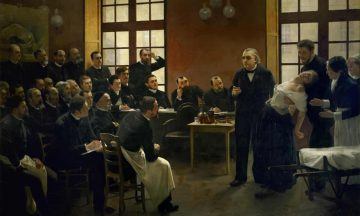Wendy Moore in The Guardian:
 The history of medicine abounds with oddball characters and bizarre events. Yet few figures are quite as eccentric as the French neurologist Jean-Martin Charcot and few episodes reach the levels of absurdity displayed in his demonstrations of “hysterical” women being hypnotised in Paris in the late 19th century. Charcot had begun so promisingly. Early in his career he made groundbreaking discoveries in multiple sclerosis and Parkinson’s disease, thereby earning himself the epithet “father of neurology”. But he became fixated on “hysteria”, a catch-all diagnosis that Victorian doctors applied to unconventional behaviour that defied medical explanation. For more than a decade Charcot hypnotised scores of patients, mostly women, at the Salpêtrière asylum in his quest to show their condition had a biological cause rooted in the brain. According to his twisted logic, if patients reproduced their strange antics and seizures under hypnosis this proved their illness was real not feigned and was therefore a physical not a mental disorder. Crowds of eminent doctors and scientists, the vast majority male, packed the hospital to watch Charcot induce his patients to adopt ridiculous poses and act out ludicrous scenes.
The history of medicine abounds with oddball characters and bizarre events. Yet few figures are quite as eccentric as the French neurologist Jean-Martin Charcot and few episodes reach the levels of absurdity displayed in his demonstrations of “hysterical” women being hypnotised in Paris in the late 19th century. Charcot had begun so promisingly. Early in his career he made groundbreaking discoveries in multiple sclerosis and Parkinson’s disease, thereby earning himself the epithet “father of neurology”. But he became fixated on “hysteria”, a catch-all diagnosis that Victorian doctors applied to unconventional behaviour that defied medical explanation. For more than a decade Charcot hypnotised scores of patients, mostly women, at the Salpêtrière asylum in his quest to show their condition had a biological cause rooted in the brain. According to his twisted logic, if patients reproduced their strange antics and seizures under hypnosis this proved their illness was real not feigned and was therefore a physical not a mental disorder. Crowds of eminent doctors and scientists, the vast majority male, packed the hospital to watch Charcot induce his patients to adopt ridiculous poses and act out ludicrous scenes.
His star patient, Blanche Wittmann, known as “queen of the hysterics”, had been sexually abused as a teenager. Under hypnosis she was persuaded to cower in fear of an imaginary snake, lead her troops into battle as a pretend general and remove her clothes. It is a wonder Charcot’s spectators did not march him to the cells after these performances rather than his unfortunate victims. Yet paradoxically all this time he was surrounded by an epidemic of manic behaviour that filled psychiatric institutions and was truly caused by brain disease – neurosyphilis. While he, the founder of neurology, was obsessed with proving that mental illness was caused by lesions in the brain, patients with neurosyphilis were left to the forerunners of modern psychiatry.
In this absorbing and scholarly book, Allan Ropper and Brian Burrell home in on Charcot’s strange shows as the seminal moment when psychiatry and neurology split and began their journeys along separate but intertwining paths towards a partial convergence today.
More here.
